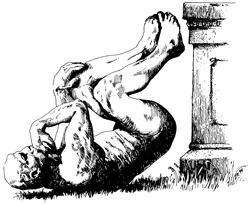
The 2021 Ig Nobel Prizes were awarded on September 9 in a virtual ceremony available to watch here.
The Ig Nobel Prizes honor achievements that make people LAUGH, then THINK. The prizes are intended to celebrate the unusual, honor the imaginative — and spur people’s interest in science, medicine, and technology.
THE 2021 IG NOBEL PRIZE WINNERS
- BIOLOGY PRIZE: Susanne Schötz for analyzing variations in purring, chirping, chattering, trilling, tweedling, murmuring, meowing, moaning, squeaking, hissing, yowling, howling, growling, and other modes of cat–human communication.
- ECOLOGY PRIZE: Leila Satari, Alba Guillén, Àngela Vidal-Verdú, and Manuel Porcar, for using genetic analysis to identify the different species of bacteria that reside in wads of discarded chewing gum stuck on pavements in various countries.
- CHEMISTRY PRIZE: Jörg Wicker, Nicolas Krauter, Bettina Derstroff, Christof Stönner, Efstratios Bourtsoukidis, Achim Edtbauer, Jochen Wulf, Thomas Klüpfel, Stefan Kramer, and Jonathan Williams, for chemically analyzing the air inside movie theaters, to test whether the odors produced by an audience reliably indicate the levels of violence, sex, antisocial behavior, drug use, and bad language in the movie the audience is watching.
- ECONOMICS PRIZE: Pavlo Blavatskyy, for discovering that the obesity of a country’s politicians may be a good indicator of that country’s corruption.
- MEDICINE PRIZE: Olcay Cem Bulut, Dare Oladokun, Burkard Lippert, and Ralph Hohenberger, for demonstrating that sexual orgasms can be as effective as decongestant medicines at improving nasal breathing.
- PEACE PRIZE: Ethan Beseris, Steven Naleway, and David Carrier, for testing the hypothesis that humans evolved beards to protect themselves from punches to the face.
- PHYSICS PRIZE: Alessandro Corbetta, Jasper Meeusen, Chung-min Lee, Roberto Benzi, and Federico Toschi, for conducting experiments to learn why pedestrians do not constantly collide with other pedestrians.
- KINETICS PRIZE: Hisashi Murakami, Claudio Feliciani, Yuta Nishiyama, and Katsuhiro Nishinari, for conducting experiments to learn why pedestrians do sometimes collide with other pedestrians.
- ENTOMOLOGY PRIZE: John Mulrennan, Jr., Roger Grothaus, Charles Hammond, and Jay Lamdin, for their research study “A New Method of Cockroach Control on Submarines”.
- TRANSPORTATION PRIZE: Robin Radcliffe, Mark Jago, Peter Morkel, Estelle Morkel, Pierre du Preez, Piet Beytell, Birgit Kotting, Bakker Manuel, Jan Hendrik du Preez, Michele Miller, Julia Felippe, Stephen Parry, and Robin Gleed, for determining by experiment whether it is safer to transport an airborne rhinoceros upside-down.
[Thanks to Mike Kennedy for the story.]
Discover more from File 770
Subscribe to get the latest posts to your email.

So now I’m trying to reconcile this https://www.newser.com/story/310856/kim-jong-un-is-suddenly-looking-svelte.html with the Economics prize study.
Cockroach control on submarines may have important consequences for space flight.
I’m with Rob: anybody who’s ever had to deal with flea, bedbug or rat infestations can testify that the results can be devastating.
@fjbergmann: and my first thought was of Putin. Possibly these are statistical outliers.
Pingback: Ig Nobel Prize Winners: 2021 – Musings
Hilariously awesome and awesomely hilarious! 😀 Congratulations to these diligent scientists, but I’m worried about the rhino. 😉
ETA: Although if being transported upside-down affected the rhino’s breathing, I see the Medicine Prize has a solution (requires: a second rhino). 😛
My spirit animal is a rhinoceros, and this deeply amuses partner and kids.
I’m waiting for Dr. Schötz’s Cat Translation device. While I pretty much know what they’re saying (“Feed Me, Seymour”), I want a way to reply in kind (“I know you’re still hungry but you’re only getting one can, Garfield”).
Remember that 22 September, 2021, is World Rhinoceros Day, as well as the Equinox.
My spirit animal as well.
Send some money to the sanctuaries working to protect the very rare species.